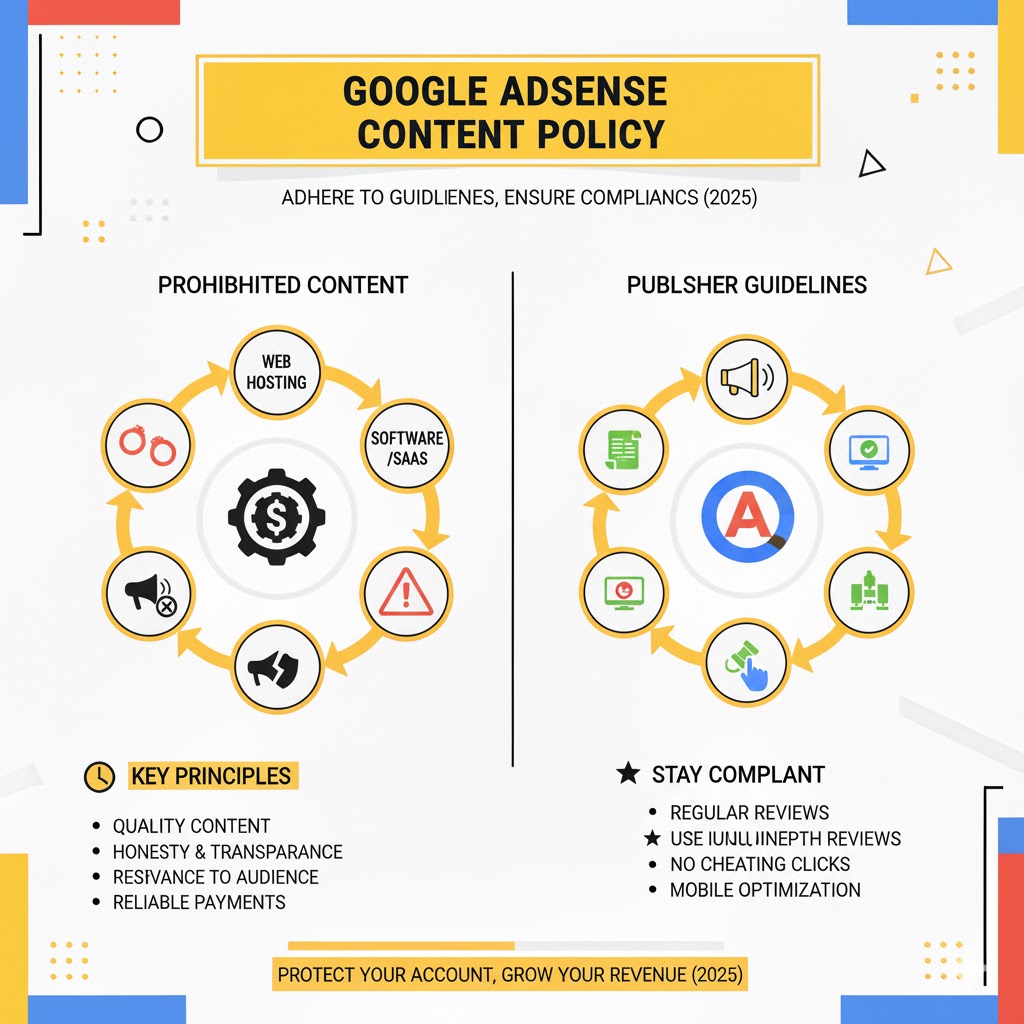In the ever-evolving digital world, Google AdSense remains one of the most trusted and rewarding monetization platforms for bloggers, publishers, and website owners. It has helped millions transform their passion for content creation into a steady stream of income — but success with AdSense doesn’t come from luck or traffic alone. It comes from understanding and following Google’s policies with precision and professionalism.
As Google continues refining its algorithms and ad standards in 2025, compliance has become more important than ever. The company’s core mission is to maintain a safe, transparent, and high-quality advertising ecosystem — one where users enjoy relevant content, advertisers feel confident about placements, and publishers are rewarded fairly. That’s why even a minor violation of AdSense policy can result in restricted ads, demonetization, or permanent suspension.
For serious bloggers, learning the ins and outs of AdSense policy isn’t optional — it’s essential. Whether you’re applying for your first approval or managing a high-traffic blog, you need to know exactly what Google expects from publishers in terms of content quality, ad placement, user experience, and privacy compliance.
In this comprehensive 2025 guide, we’ll break down every key aspect of the Google AdSense Policy — including eligibility requirements, content restrictions, ad placement rules, and best practices for staying compliant. By the end, you’ll have a clear understanding of how to keep your site AdSense-safe, maximize your earnings ethically, and build a long-term, sustainable income online.
Google AdSense Policy: The Complete 2025 Guide for Bloggers and Website Owners
Introduction: Understanding Google AdSense in 2025
For millions of bloggers and website owners, Google AdSense remains one of the most popular and trusted ways to earn passive income online. It’s simple: you publish quality content, display Google ads on your site, and earn money whenever visitors view or interact with those ads. But there’s one critical factor that determines whether your AdSense journey becomes a success or a struggle — understanding and following Google AdSense policies.
In 2025, AdSense continues to evolve alongside Google’s AI-driven algorithms and updated advertising standards. Google’s main goal is to protect users, advertisers, and publishers alike by maintaining a safe, high-quality digital advertising ecosystem. This means that violating even one of Google’s core AdSense policies — intentionally or unintentionally — can lead to serious consequences, including demonetization or permanent account suspension.
In this in-depth guide, we’ll break down everything you need to know about Google AdSense policies — from eligibility criteria and content restrictions to website requirements and best practices for compliance. Whether you’re applying for AdSense for the first time or managing a monetized blog, this 5000+ word guide will serve as your complete reference to staying AdSense-approved and profitable in 2025.
1. What Is Google AdSense?
Google AdSense is an advertising platform by Google that allows website owners, bloggers, and YouTubers to earn money by displaying targeted ads on their content. Advertisers pay Google to run ads through its AdWords (now Google Ads) network, and Google shares a portion of that revenue with publishers who host those ads through AdSense.
AdSense uses advanced algorithms and machine learning to match ads with your content based on keywords, audience behavior, and interests. This ensures that visitors see ads relevant to their needs, improving both user experience and ad performance.
In simple terms:
- You create content.
- Google places relevant ads.
- You earn money when visitors click or view those ads.
2. Why AdSense Policies Matter
Google AdSense policies are not just a list of rules — they’re the foundation of a fair and secure digital advertising ecosystem. These guidelines protect everyone involved:
- Advertisers, who want their ads to appear on trustworthy and brand-safe websites.
- Users, who expect to see high-quality, non-misleading content and ads.
- Publishers (like you), who benefit from a reliable and sustainable source of income.
Failing to comply with AdSense policies can lead to serious outcomes:
- Ad limit restrictions (temporary monetization block).
- Partial ad serving (ads only on certain pages).
- Account suspension or permanent termination.
Once your account is terminated, it’s extremely difficult — often impossible — to get reinstated. That’s why every blogger should treat the AdSense Policy Center as a rulebook, not an afterthought.
3. Eligibility Requirements for AdSense (2025 Update)
Before applying for AdSense, your blog or website must meet specific eligibility requirements. These are the basic conditions Google expects every publisher to fulfill:
a. Unique and Valuable Content
Your website must contain original, high-quality, and valuable content. Google rejects applications with:
- Plagiarized or copied material.
- Automatically generated (AI-spun) content.
- Thin pages with little to no useful information.
Each page on your site should provide a unique user experience — not just a rewritten version of another website.
b. Website Ownership and Navigation
You must own the website you’re applying with, and it must have:
- A functional navigation menu.
- Working internal and external links.
- Clear categories and structure.
Your site should not confuse visitors or lead them to broken pages.
c. Domain Age and Activity
In some countries, especially in Asia (like India, China, and Pakistan), Google requires websites to be at least 6 months old before approval.
Your site must also show consistent activity and content updates.
d. Compliance with Webmaster Guidelines
Your website must follow Google Search Console’s Webmaster Guidelines, which include:
- No black-hat SEO practices.
- No deceptive redirects or hidden text.
- Mobile-friendliness and fast loading times.
e. Age Requirement
The account holder must be at least 18 years old to legally manage AdSense payments.
4. Core Google AdSense Content Policies
Google carefully monitors the content that appears on AdSense-approved sites. The following are the main content categories that violate AdSense policy and should be avoided completely:
a. Adult and Sexual Content
Any content that includes nudity, sexual acts, pornography, or erotic material is prohibited. Even suggestive or borderline adult material (e.g., sexual wellness content, dating advice with explicit imagery) can trigger violations.
b. Dangerous or Derogatory Content
This includes hate speech, harassment, or content that promotes discrimination based on race, gender, religion, or sexual orientation.
Example: Content encouraging violence or attacking individuals or groups.
c. Misleading or Deceptive Information
Content that spreads false information, scams, or misleading claims about products, politics, or health is strictly forbidden.
Avoid clickbait titles that exaggerate or misrepresent facts.
d. Copyrighted Material
You can’t use copyrighted images, videos, or text without permission.
If you use media, ensure it’s royalty-free or licensed for reuse.
e. Violence and Gore
Content that glorifies violence, crime, or animal cruelty is disallowed.
Even “shock content” for entertainment purposes can violate AdSense rules.
f. Illegal or Regulated Products
Promoting illegal drugs, weapons, counterfeit goods, or regulated substances (like alcohol or tobacco) is not allowed.
g. Gambling and Betting
Gambling-related content (online casinos, sports betting, etc.) requires special Google approval. Without it, such pages violate AdSense policy.
5. Ad Placement and Layout Policies
Even if your content is perfect, how you place ads matters a lot. Improper ad placement can get your account flagged.
a. Don’t Mislead Users
Ads must be clearly distinguishable from your content. Don’t design your layout in a way that tricks visitors into clicking ads accidentally.
b. Avoid Excessive Ads
A page overloaded with ads provides a poor user experience. Keep a healthy balance between content and ad space.
c. No Ads on Non-Content Pages
Never display AdSense ads on:
- Login pages
- Thank-you pages
- 404 error pages
- Empty or under-construction pages
d. No Auto-Refreshing Ads
AdSense prohibits using scripts that automatically refresh or reload pages to generate fake impressions.
6. Traffic and Click Policies
Google uses smart algorithms to detect suspicious traffic patterns. You must ensure all your traffic and clicks are organic and genuine.
a. Invalid Click Activity
Never click your own ads or encourage others to do so.
Phrases like “Support us by clicking ads” violate policy.
b. Paid or Bot Traffic
Don’t buy cheap traffic from shady services. Google can easily detect non-human clicks.
c. Encouraging Clicks
Avoid placing ads near misleading text like “Check out these offers” or “Click here for more info.”
7. Website Design and User Experience Standards
A well-structured, user-friendly website is essential for AdSense approval and compliance.
a. Mobile Responsiveness
In 2025, over 70% of web traffic comes from mobile devices. Your site must display perfectly across all screen sizes.
b. Loading Speed
Slow websites lead to poor user experience and reduced ad impressions. Use caching, compression, and image optimization to improve performance.
c. Navigation and Accessibility
Visitors should easily find your About, Contact, and Privacy Policy pages.
Clear menus and clickable sections help with AdSense trust and approval.
8. Privacy and Data Protection Policies
Google requires every AdSense publisher to maintain transparency about how user data is collected.
a. Privacy Policy Page
You must include a visible privacy policy page that explains:
- How cookies are used.
- How user information is stored or processed.
- Third-party advertising disclosure.
b. Cookie Consent (GDPR & CCPA)
If you have visitors from the EU or California, display a cookie consent notice in compliance with privacy laws.
9. AdSense Account Suspension: Causes and Recovery
Violations can lead to either temporary ad restrictions or permanent bans. Understanding how to prevent and recover is crucial.
Common Reasons for Suspension
- Invalid click activity.
- Policy-violating content.
- Traffic from prohibited sources.
- Incomplete or misleading account details.
What to Do If Suspended
- Read the email from AdSense carefully.
- Fix every issue mentioned in the Policy Center.
- Submit an appeal only after ensuring full compliance.
- Be honest and transparent in your appeal response.
10. Best Practices to Stay AdSense-Approved in 2025
- Create original, audience-focused content.
- Monitor your traffic sources regularly.
- Follow updates in Google’s Publisher Policy Center.
- Never use manipulative SEO tactics.
- Keep your site safe from malware or phishing threats.
11. Alternative Monetization Options
If you struggle to meet AdSense requirements, consider these alternatives:
- Affiliate marketing programs.
- Sponsored content and brand deals.
- Selling digital products or courses.
- Display ad networks like Media.net, Ezoic, or Propeller Ads (for compliant sites).
Conclusion: Playing the Long Game with AdSense
Earning through Google AdSense isn’t about quick wins — it’s about building trust, delivering value, and staying compliant. Every successful AdSense publisher understands that policies are not obstacles but guardrails for long-term success.
By respecting Google’s content and ad standards, focusing on quality, and maintaining ethical practices, you can transform your blog into a sustainable business that earns consistent passive income for years to come.
In 2025 and beyond, the formula remains simple yet powerful: great content + user trust + AdSense compliance = lasting success.

